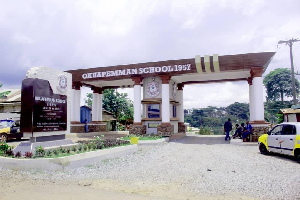- Home - News
- TWI News | TV
- Polls
- Year In Review
- News Archive
- Crime & Punishment
- Politics
- Regional
- Editorial
- Health
- Ghanaians Abroad
- Tabloid
- Africa
- Religion
- Election 2020
- Coronavirus
- News Videos | TV
- Photo Archives
- News Headlines
- Press Release
General News of Wednesday, 10 October 2007
Source: GNA
30th Annual congress of GNUPS opens
Accra, Oct 10, GNA - Nana Akomea, Minister of Manpower, Youth and Employment, on Wednesday underscored the importance of involving the private sector in polytechnic education to help to make end products more useful and relevant for commerce and industry. He said technical and science education was currently the master key towards modern day development and therefore must be taken seriously to reap its full benefits.
Nana Akomea, who was addressing delegates of the 30th Annual Congress of the Ghana National Union of Polytechnic Students (GNUPS), said the advent of technical education beginning as far back as 1909, with the establishment of the Ghana Secondary Technical School (GSTS) was a bold attempt to mainstream technical education to make up for complete development.
He said years after this brilliant idea, "it seems that much investment has not been made to enhance the vision, as polytechnic education has not received the best of support from both government and civil society".
Though the government in collaboration with its development partners over the few past years have initiated various projects and programmes aimed at equipping the polytechnics to provide effective training to students, lack of private sector involvement has resulted in stagnation of these programmes. He said the private sector must be involved in the curricula development of polytechnic education to make it more relevant to industry.
"I also suggest that opportunities must occasionally be given to experts from the private sector to lecture or give talks on the realities of the outside market to help students to know more about what is expected of them after their training," he said. The Minister expressed worry about the fact that though Ghana's polytechnics seemed to be training less students, compared to the outputs of other tertiary institutions, there seemed to be surpluses in employment of polytechnic graduates. "We can bridge this gap by ensuring that polytechnic education is made more relevant to industry and job requirements and further institute credit financing to help graduates to start up their own businesses," he said.
Nana Akomea stressed that the future of polytechnic education seemed bright but the contribution of the student body, particularly its leadership to the processes of revitalization and growth of polytechnic education in Ghana will continue to be even more crucial in the years ahead and called for commitment, dedication, creativity, innovation and peace.
Prof Dominic Fobih, Minister of Education, Science and Sports, in a speech read for him by Nana Yaa Brempong, a Director for Tertiary Education at the Ministry, said the government with the support of the Canadian International Development Agency (CIDA), was pioneering the introduction of practical entrepreneurial training in polytechnics in the three Northern Regions and expressed the hope to replicate them in the other polytechnics upon successful implementation.
He said industry could also contribute to the financing of education in the country through the provision of educational vouchers and scholarships to polytechnic students whose services they intended to engage after graduation.
He, however, noted that private-public partnership thrived when there were systems that ensured transparency and accountability. He said the Government would provide a congenial atmosphere, regulatory framework and incentives to encourage full participation of the private sector in polytechnic education. Mr Stephen Asare Amankwah, President of GNUPS, commended the Government for the numerous investments it had made towards enhancing polytechnic education and for President J.A Kufuor assenting to the Polytechnic Bill into law.
He said the GNUPS welcomed the existence of the law and looked forward to its full implementation. Mr Amankwah said the delegates would critically look at the theme of the congress, as it demanded greater contributions of polytechnic products in their various sectors of endeavours. He said many organizations and institutions in the country had attested to the immense contributions of polytechnic products, which were signs of the good skills and knowledge they acquired in their respective fields.
He appealed to the public to make polytechnic education a priority, saying it was good administration, effective management, science and technology that would move the country to a different level and drastically reduce poverty and ignorance in the country. The Congress, which is under the theme: "Ghana @ 50, Improvement in Polytechnic Education, the need for Public-Private Partnership," would allow delegates from the various institutions in the country to brainstorm on the way forward to enhancing polytechnic education with support from the private sector among other concerns. 10 Oct. 07










